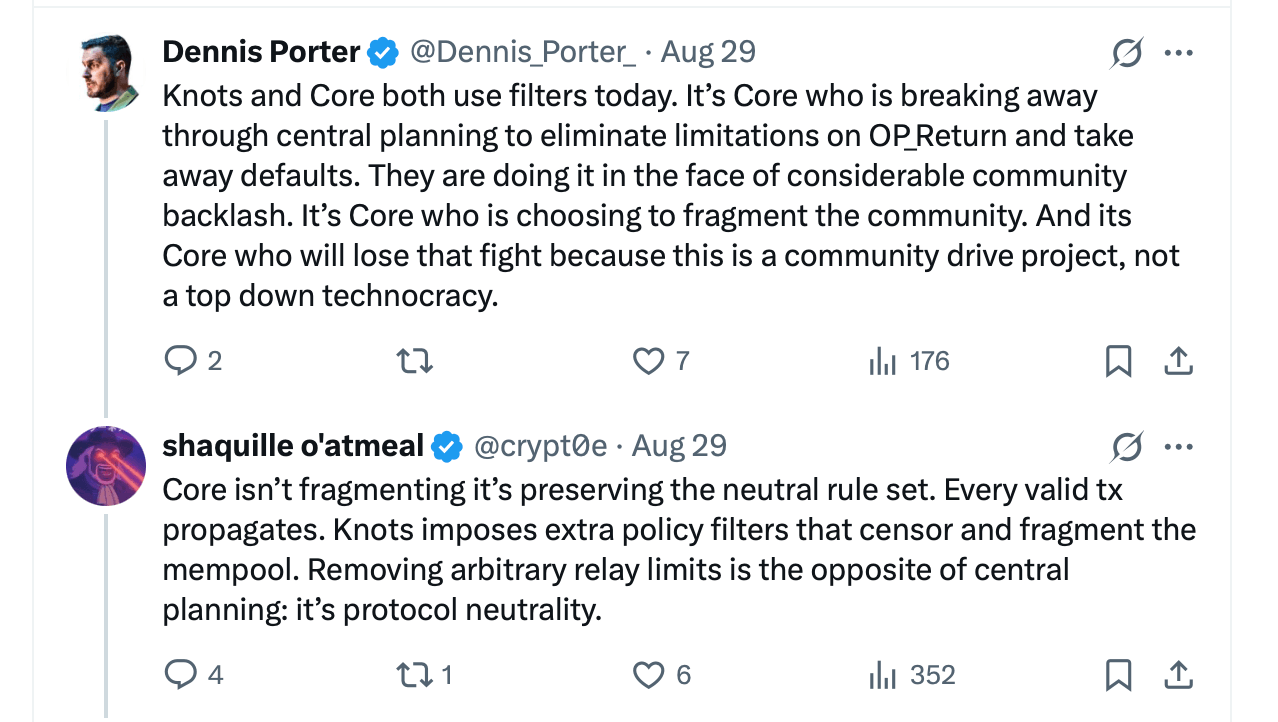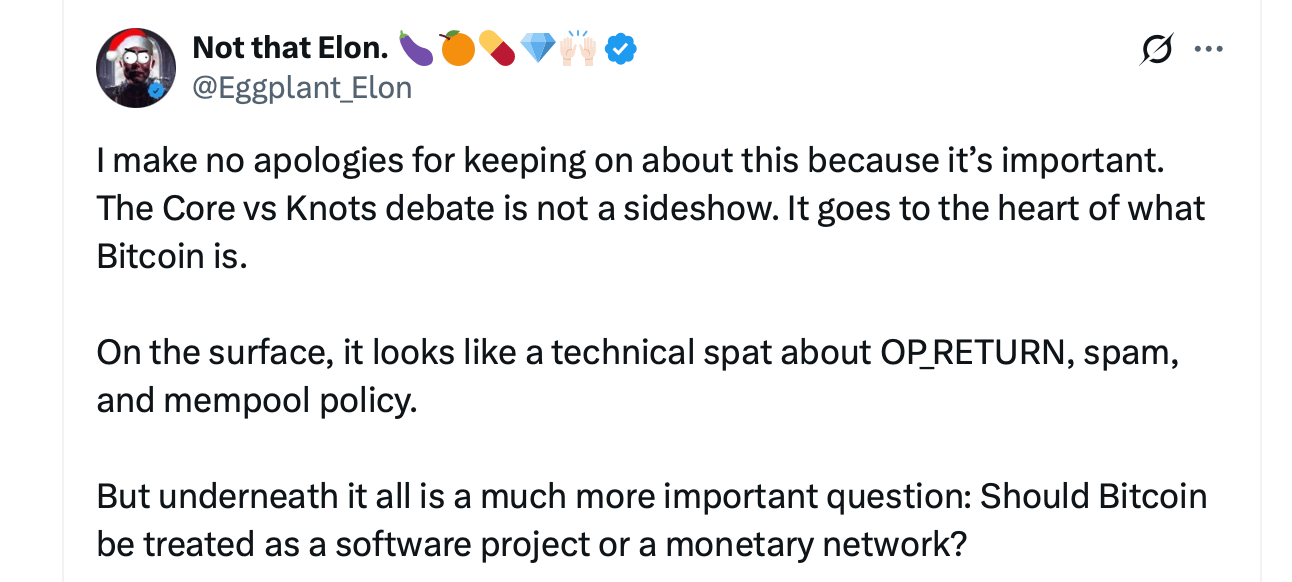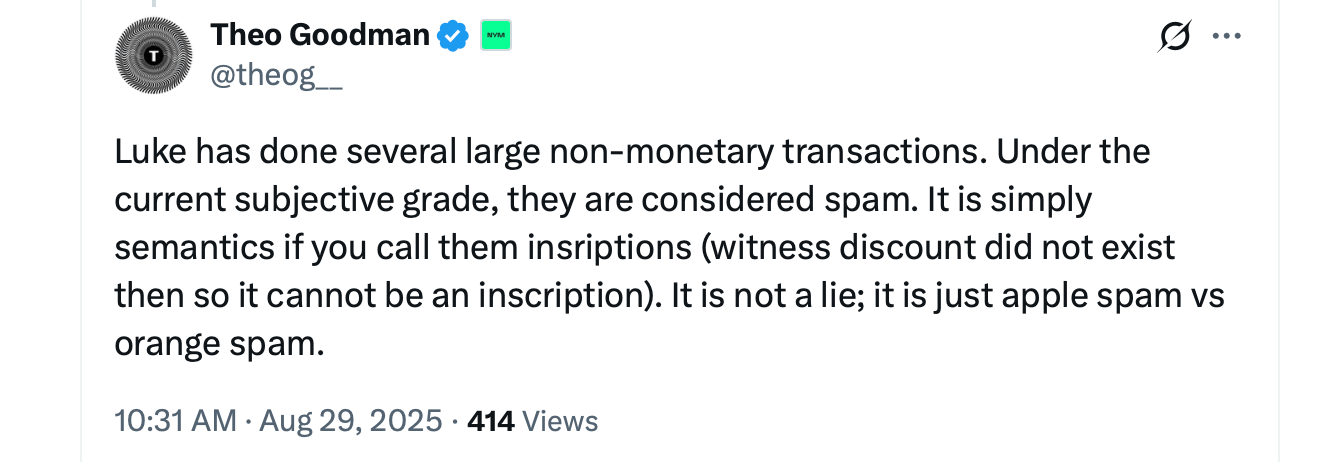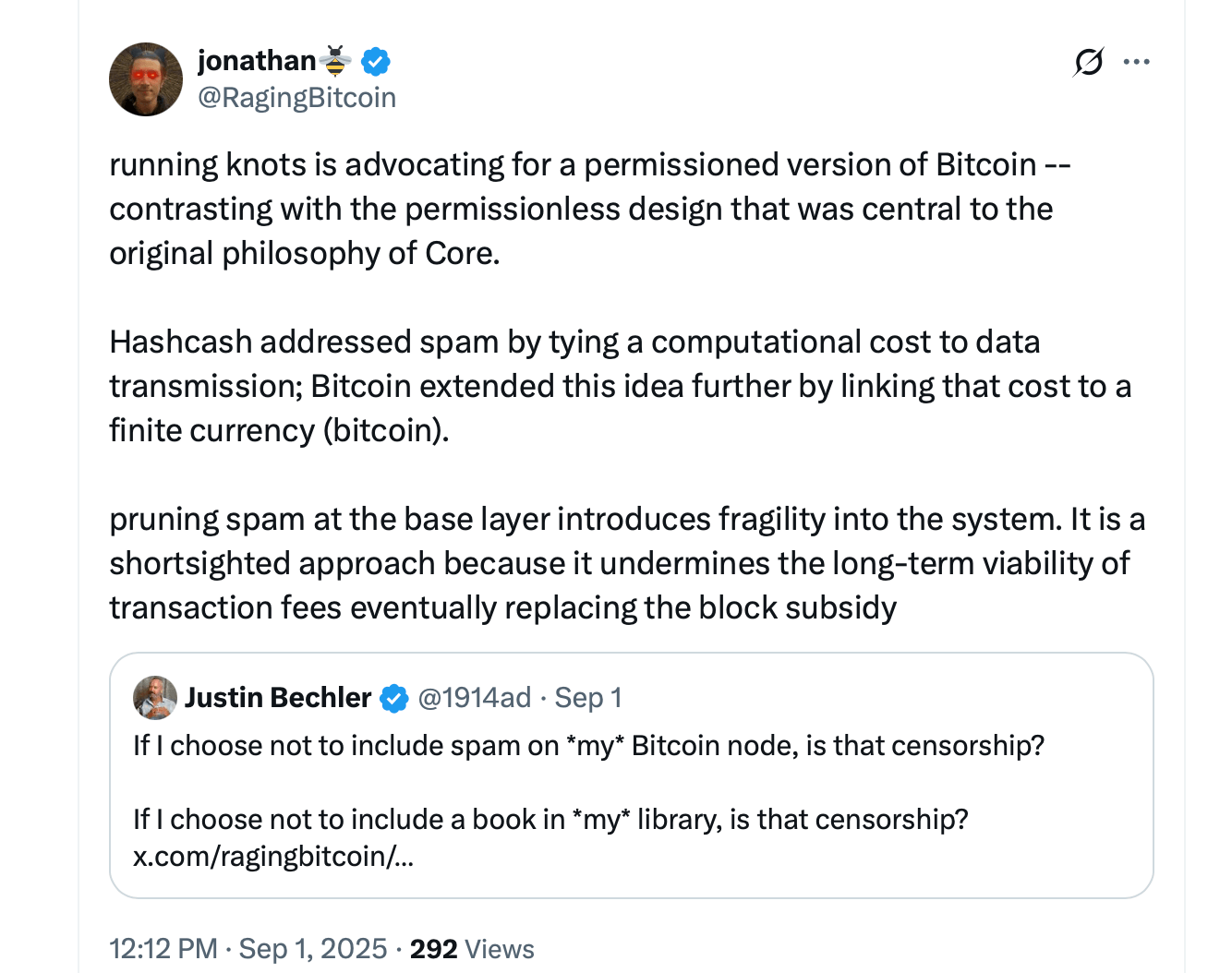Bitcoin’s public node count stands at 23,163, with 18,850 running Bitcoin Core and 4,265 running Bitcoin Knots-placing Knots at 18.41%-as a weeklong back-and-forth on X showcases whether the network should lean on fee incentives alone or allow stricter relay policies to curb non-monetary data. 😏
‘Money First’ vs. ‘Neutral Ledger’: Bitcoin’s Node Wars Play out Theoretically on X
Across 174 unique X posts from Aug. 27 to Sept. 3, BTC supporters framed the dispute around first principles: Is Bitcoin foremost a monetary network whose neutrality requires relaying all valid transactions, or should node operators prefer software that filters certain patterns at the mempool and relay layers to discourage large, non-monetary payloads? 🎭

Over the last week, supporters of Knots have repeatedly argued that stricter default policies are a pragmatic safeguard, not a change to consensus, emphasizing that both clients accept blocks containing inscriptions and other valid transactions. Their contention is that Knots exposes more configurable policy “knobs” and defaults to tighter data-carrier rules, allowing operators to reduce bandwidth and storage pressure from non-monetary data without rejecting valid blocks. 🤷♂️

Core-leaning posters have countered that neutrality is the point of the protocol: if a transaction is consensus-valid and the fee market prices block space, relay filters impose subjective judgments at the network layer. In this view, fee competition-not application-level heuristics-is the intended allocator of scarce block space; hard-coding content preferences risks fragmentation and sets precedent for gatekeeping. 🎩

A prominent theme in Knots-friendly X posts was the claim that expanding or relaxing relay limits (often framed around OP_RETURN payload size) could facilitate the storage of arbitrarily large files, making node operation costlier and, in extreme hypotheticals cited by many X accounts over the last week, raising reputational and legal concerns if offensive content were pushed through mempools. Several posts argued that filters are a form of “hygiene,” meant to keep nodes focused on monetary data. 🧼

Core-side replies questioned both the efficacy and the necessity of such filters. One line of argument said relay filters do not reduce what miners include in blocks and therefore do little to ease historical sync or stop data from reaching the chain; fee dynamics, they said, are sufficient to make non-financial stuffing expensive. This camp tended to view policy filtering as redundant and potentially ideological. 🤨

The money-versus-data framing recurred a great deal throughout the week. Posters backing Knots said Bitcoin should privilege monetary transactions, likening broad data relay to turning nodes into personal file servers for anonymous uploaders. They cast the choice of client as a vote for Bitcoin’s scope: money first, or a general data ledger. Others responded that Bitcoin does not define “monetary” at the script level; transactions are just structures checked by consensus rules. 🎯

Neutrality advocates frequently pointed out that both Core and Knots accept consensus-valid blocks, including those with inscriptions, arguing that treating mempool policy as a proxy for consensus can mislead users about what a node enforces. In that framing, switching clients doesn’t remove data from the chain; it only changes what a node relays or displays. 🎩
Interested in what the fuss is all about? Read this post for some more background on the debate.
Some posters elevated the dispute to governance and legitimacy. A subset argued that Knots signals a “network-first” ethos-developers propose software, but nodes decide; if Core ships changes the network rejects, the network wins. Others accused both sides of injecting philosophy into tooling, but the majority of posts sorted along the neutrality-versus-filtering axis. 🏛️
The dispute reflects deeper questions about how Bitcoin evolves when client diversity grows more visible. With both Core and Knots offering valid paths for operators, the debate hints at a broader test: whether differing policies strengthen resilience by offering choice, or whether diverging defaults could fragment perceptions of what it means to run a “neutral” Bitcoin node. 🎭
The heated conversations also illustrate how cultural narratives shape technical preferences. Supporters did not merely weigh bandwidth costs or block space efficiency; they invoked identity, governance, and long-term trust in the network. This suggests future disputes may extend beyond code into questions of legitimacy, with the balance between neutrality and discretion shaping Bitcoin’s trajectory as much as protocol upgrades. 🎩
Read More
- EUR USD PREDICTION
- Epic Games Store Free Games for November 6 Are Great for the Busy Holiday Season
- How to Unlock & Upgrade Hobbies in Heartopia
- Battlefield 6 Open Beta Anti-Cheat Has Weird Issue on PC
- Sony Shuts Down PlayStation Stars Loyalty Program
- The Mandalorian & Grogu Hits A Worrying Star Wars Snag Ahead Of Its Release
- ARC Raiders Player Loses 100k Worth of Items in the Worst Possible Way
- Unveiling the Eye Patch Pirate: Oda’s Big Reveal in One Piece’s Elbaf Arc!
- TRX PREDICTION. TRX cryptocurrency
- Prime Gaming Free Games for August 2025 Revealed
2025-09-05 01:00